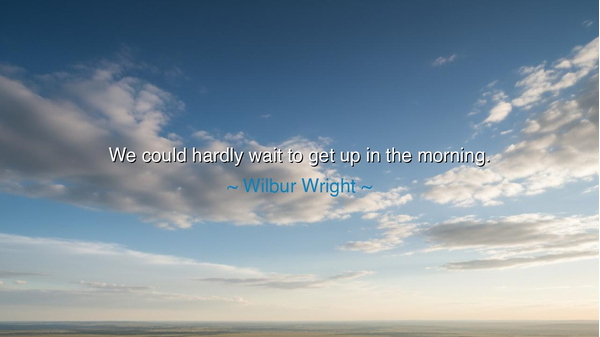
We could hardly wait to get up in the morning.






In the words of Wilbur Wright, “We could hardly wait to get up in the morning.” At first, these words seem childlike, filled with the simple excitement of a new day. Yet beneath their modest tone lies the blazing spirit of discovery, the fire of men who lived on the edge of the impossible. For Wilbur spoke not of idleness or ease, but of the holy restlessness that drove him and his brother Orville to rise each dawn with hearts aflame, eager to shape wood, fabric, and wind into the first living wings of humankind. This eagerness is the mark of passion: to awaken with joy not because of leisure, but because of purpose.
The quote reveals the essence of true calling. Most rise to their day with weariness, burdened by duties that drain the soul. But those who have found their purpose, as the Wright brothers found theirs, greet each dawn as a gift. To “hardly wait” for the morning is to live in alignment with one’s destiny, to feel each day as an opportunity to advance a dream. It is the state of the artist who cannot leave the canvas, the philosopher who burns midnight oil, the athlete who craves the training field, the inventor who sees in every sunrise another chance to test his vision.
The ancients knew this spirit well. Archimedes, seized by sudden insight, leapt from his bath and ran naked through the streets of Syracuse crying “Eureka!” His passion could not be restrained by sleep or by social restraint. So too did Wilbur and Orville feel the pull of their vision. In the sands of Kitty Hawk, battered by wind and doubt, they rose each morning not discouraged, but emboldened, ready to fail a hundred times if it meant one success. To awaken with joy, even in struggle, is the hallmark of a spirit driven by higher purpose.
History provides many such examples. Consider Marie Curie, who labored tirelessly in dimly lit laboratories, enduring poverty, illness, and exhaustion, yet each day rose with determination to unlock the secrets of radiation. She too must have known the eagerness that Wilbur describes. For when the heart burns with a mission, fatigue is forgotten, obstacles are embraced, and dawn is no enemy but a herald of new possibilities.
The emotional force of Wilbur’s words lies also in their humility. He does not boast of triumph, of fame, or of the monumental change that flight would bring to humanity. Instead, he speaks simply of the joy of rising to labor. This humility itself is a lesson: greatness is not born from the pursuit of glory, but from love of the work itself. To greet the morning with eagerness is not to seek applause, but to delight in the craft, the struggle, the possibility of creation.
This quote also calls us to examine our own lives. Do we rise each morning with eagerness, or do we drag ourselves into the day with dread? If the latter, perhaps it is because we have not yet found the work that sets our spirit alight. Wilbur’s words challenge us: seek the labor that makes you “hardly wait to get up in the morning.” It may not be easy, it may not be grand, but it will be the labor that makes life radiant and purposeful.
So, O listener, take this teaching into your heart: find the work that awakens you. Do not settle for mere survival, for the dull routine that dims the soul. Search, strive, experiment, and create until you discover the calling that makes each dawn a gift. And when you find it, pursue it as Wilbur and Orville pursued the sky—with joy, with resilience, and with unshakable faith that each new morning is another chance to touch the impossible.
Thus the lesson is clear: greatness is not only found in achievement, but in the passion that greets the dawn. To “hardly wait to get up in the morning” is to live a life aligned with purpose, and such a life, whether it changes the world or not, is already a life of triumph.






AAdministratorAdministrator
Welcome, honored guests. Please leave a comment, we will respond soon